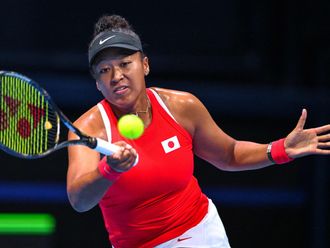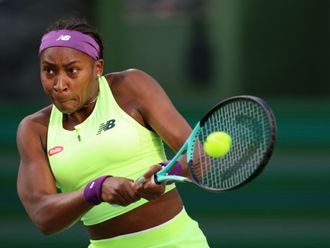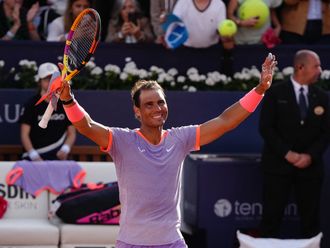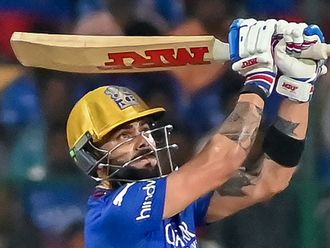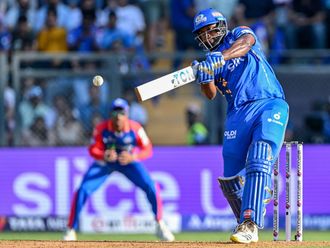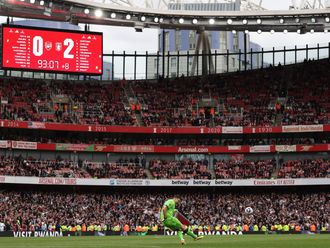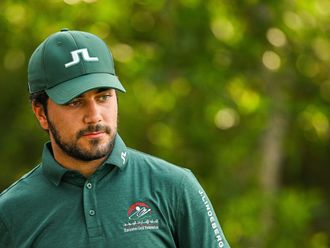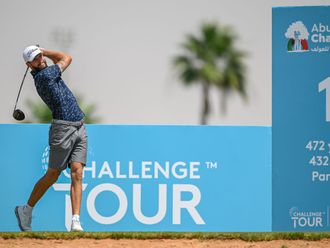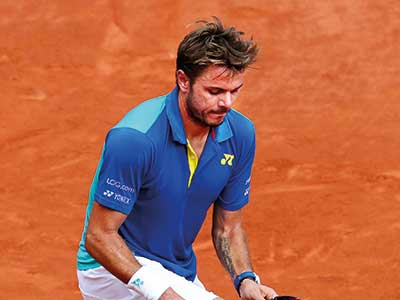
London: “Stress is part of your career,” Stan Wawrinka says on a sleepy and sunny Sunday afternoon at the Queen’s Club in London. “You have to accept it and deal with it because there is a lot of emotion in tennis. There are so many ups and downs — even in one big match — but I have been playing at this level so long now I am used to it. Just over a week has passed since he lost to Rafael Nadal in the final of the French Open and Wawrinka appears determined to avoid a stressful interview. He opts for a much more low-key series of answers than in the evocative interview he gave when we last spoke three years ago. Then Wawrinka was open and engaging as he spoke in detail about the Samuel Beckett quote he has tattooed on his left arm and the elation of winning his first grand slam tournament.
Today he is obviously reluctant to enter a proper conversation. He is in the mood for a routine press conference-style interview, devoid of anything too personal, as if he wants to conserve his energy for the more important battles that lie ahead. The world No. 3 has turned his attention to the grass-court season and his quiet hope that he might produce his best performance at Wimbledon — the only major he has yet to win. Wawrinka has not progressed beyond the Wimbledon quarter-finals, which he reached in 2014 and 2015, and he insists, rightly, that any speculation he might become the sixth man to win all four majors since tennis became fully professional in 1968 is merely hypothetical. Rod Laver, Andre Agassi, Roger Federer, Nadal and Novak Djokovic are the only men to have completed the set in 50 years and the late-blooming and now 32-year-old Wawrinka could join them if he can find a way to win Wimbledon next month. Since he appointed Magnus Norman as his coach Wawrinka has become a grand slam champion in each of the last three years — winning the Australian Open in 2014, the French in 2015 and last year the US Open.
He has also done it the hard way — beating the world No. 1 each time by defeating Nadal in Melbourne and Djokovic in the other two finals. The stress embedded into such achievements is evident when, remembering the most recent of them in New York, Wawrinka scrunches up his face. “The hardest was the US Open. It was more stressful than the other two. I can’t explain it but for some reason I was much more nervous before that match. I didn’t have a feeling I was going to win. It was the opposite. I was really stressed. It was getting to my nerves but by the time I got on court I was able to calm myself and focus on my tennis.”
How does Wawrinka, who appears a sensitive and shy man off the court, control his nerves and play his best when it matters most? “It’s a long process,” he says with a shrug. “It takes a long time to put all the pieces of the puzzle together. The mental challenge, the fitness levels, the quality of your tennis must all be there. Of course there is a hard test mentally just before the final and so, for sure, Magnus is a big part of my success. Since we started working together I’ve had the best moments in my career.”
Does he talk about his emotions to Norman when he feels most vulnerable before a final? “We know each other so well so it’s not always that I need to say it to Magnus. Sometimes I talk to him about it, sometimes I keep it to myself. We know that once the match starts I am out there on the court alone with my opponent.
“You know you are going to have pain and there is no easy way. Every player has to go through that in the big matches. But it’s also what I enjoy most about tennis. Those big matches when you go through so much are the best thing. Those matches are why you play tennis. Last week I played a semi-final in the French and it lasted for more than four hours against Andy Murray. It was a five-set match and it was up and down. That’s the reason you practise so hard — to get to those moments and to enjoy them.”
Wawrinka’s flawless record in major finals came to a shuddering halt at Roland Garros as an imperious Nadal crushed him 6-2, 6-3, 6-1. The Spaniard played brilliantly but was Wawrinka drained by his match against Murray? “You have to say Rafa was amazing for two weeks. He was stronger than everyone and that’s the main reason I lost. But after a few days I felt better and reaching another grand slam final is something big.” I had already tried to move Wawrinka beyond regimented tennis talk. But 10 minutes earlier, after just my second question, he made it plain that he did not want to discuss any aspect of his life beyond tennis. This was in response to my attempt, as when first meeting him, to try to find out something more about him away from the court. One of the most intriguing aspects of his background is that Wawrinka grew up on a farm in Switzerland alongside people with learning disabilities and depression as well as individuals recovering from drug- or alcohol-related problems.
His parents are bio-dynamic farmers who are also involved in education and social work. My opening query to Wawrinka about the farm did not appear to cause him any distress. “That’s where I grew up. That’s where I was educated, by my parents, and I had a really enjoyable young life there. It was great.” But when I asked him for more details about the farm Wawrinka said, almost apologetically: “Can we talk about something else?”
When I explained I was just hoping to learn a little more about his parents’ laudable work he shook his head again — as he did when I said that our talking personally might make for a more interesting interview. “Can we talk about something else?” he asked again. Wawrinka is entitled to make a distinction between his personal and professional life but from this moment the interview feels a constrained exchange. It is a pity because he is regarded by most writers who follow him on tour as “one of the good guys”. He is also in an interesting position — despite his familiar refusal to accept that the Big Four in tennis has gained another member.
“There is nothing to say about a big five,” Wawrinka argues. “The big four [Federer, Nadal, Djokovic and Murray] have dominated tennis for more than 10 years. Their results are better than mine but I am really happy with my level and I believe I will get better. I have beaten all four of those players but they will stay the big four because of everything they have won.” His closest rivalry is with Murray, the current world No. 1. Murray’s record against Wawrinka now stands at 10-8 and each has beaten the other three times in grand slam encounters. “Andy is the closest but the one I play less out of the big four,” Wawrinka says.
“But he is certainly the one I beat more than the other three. It’s always tough when we play and Paris was the same. But I was playing well that day so I went for it. “I have played Andy only once at Wimbledon [in 2009] and it was the first time they closed the roof. I was playing amazing tennis but Andy won in five sets. It was an incredible atmosphere with the roof closed.”
Wawrinka believes Murray is not quite as aggressive as he had been last year and, even if grass favours the Scot, the two are seeded to play in the final at the Queen’s Club on Sunday. “Queen’s is one of my favourite tournaments of the year,” Wawrinka says. “It’s a beautiful place and, especially now with the sunny weather, grass-court tennis is just perfect. I need to make some adjustments from clay but I know I can play well here. It’s a nice time of year for me because I rent a house in Wimbledon for four weeks and you feel more at home.”
A mark of Wawrinka’s seriousness about Wimbledon is that he has hired a specialist grass-court coach in Paul Annacone — who previously coached Pete Sampras and Federer. “I’ve known Paul for some time — especially when he was with Roger. He knows a lot about grass but also tennis in general. I know I can play really well at Wimbledon but I want to get better. Two years ago was my best in the quarters and I was playing great — but Roger was even better that day.” Wawrinka talks up the credentials of Federer, Murray, Djokovic and Nadal, arguing that each of them is “a big favourite” ahead of him.
“Winning Wimbledon is too far away for me to talk about it. It’s the same when people ask if I think about being No. 1. I never do that. It’s not my style. And if you look at the race to be No. 1, I am very far from it. All I can do is keep trying to improve.” He and his rivals have all endured numerous lows amid their great achievements. Do they talk personally to each other about some of the hard times? “Sometimes. I have many good friends on tour.”
Who would he consider his closest friend in tennis? “For sure, Roger. We shared so many amazing moments with the Davis Cup and the Olympics.” Yet he and Federer had their problems in November 2014 . During the ATP Tour Finals in London, and just before they played in the Davis Cup final, Wawrinka was called “a cry-baby” by Federer’s wife, Mirka. There was, apparently, a heated discussion between the two men after their match. Wawrinka, predictably, sidesteps the question. “There was no problem,” he says, looking relieved that an ATP official has already stepped into the room to confirm that our allotted time is at an end.
We look at each other and smile a little ruefully. A stress-free interview is almost over and there is time for just one more question. It will not be his media duties but what will Wawrinka miss most when his career finally ends? “For sure the emotion, the atmosphere, the intensity. I am fully into it so I am not thinking about the ending too much. As long as I am happy I will keep going. I will keep playing.”



